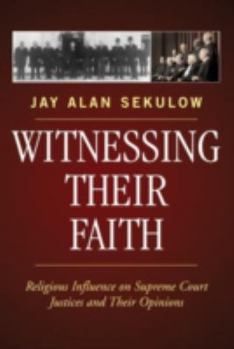Witnessing Their Faith: Religious Influence on Supreme Court Justices and Their Opinions
Select Format
Select Condition 
Book Overview
When it was ratified in 1791, the First Amendment to the Constitution of the United States sought to protect against two distinct types of government actions that interfere with religious liberty: the establishment of a national religion and interference with individual rights to practice religion.
Format:Hardcover
Language:English
ISBN:0742550648
ISBN13:9780742550643
Release Date:November 2005
Publisher:Globe Pequot Publishing Group Inc/Bloomsbury
Length:360 Pages
Weight:1.35 lbs.
Dimensions:1.0" x 6.3" x 9.3"
Customer Reviews
1 rating
A fine analysis of Supreme Court history
Published by Thriftbooks.com User , 18 years ago
Jay Sekulow has demonstrated that he is one of America's most influential and able jurists through his work done in the name of defending First Amendment religious freedoms. Furthermore, he has exhibited outstanding advocacy skills through the work he has accomplished defending those freedoms as an oral advocate arguing appellate cases before the United States Supreme Court. In his book, Sekulow takes up the pen to explain how the religious upbrining and philosophical backgrounds of individual Supreme Court justices influenced their judicial philosophy and how they ruled on important cases before the Court. The major thrust of Sekulow's thesis is that the religious attitudes and viewpoints of the Supreme Court justices underlayed their judicial philosophy and was the driving force behind and the impetus for the outcome reached in the particular cases that Sekulow analyzes. Sekulow illustrates how virtually every Supreme Court justice came from a Christian background, or if some will dispute this, atleast a theistic background with some judeo-christian presuppositions and beliefs. Moreover, Sekulow is fair in noting that, even though some justices were not distinctly Christian, their upbringing provided a basis for valuing religious freedom and viewing religion as a distinctly personal matter, but still one that should influence one's personal life and how they interact with society. Sekulow shows how many Supreme Court justices regarded Christianity as essential to ordered government and vital for American society's survivial and perseverance. Another interesting element to this book, is how Sekulow traces the emergence of the doctrine of the wall of separation between church and state. Sekulow persuasively advocates for the view that this constitutional doctrine, not actually enshrined in the words of the first amendment, arose due to the labors of concerned protestants who seeked to inhibit Catholics from receiving public money to fund private religious schools. My only criticism of this book is that Sekulow spends so much time analyzing religion that he fails to analyze other possible jurisprudential arguments. Although it may be true that religious motivations influenced individual justices, it is just as possible that each justice arrived at the conclusion they did because it was the proper legal result, and not just because the result comported with their religious beliefs. I wish Sekulow would have analyzed this dimension more because it would have strengthened his thesis in the long run. However, this is one small criticism to an otherwise excellent book.






